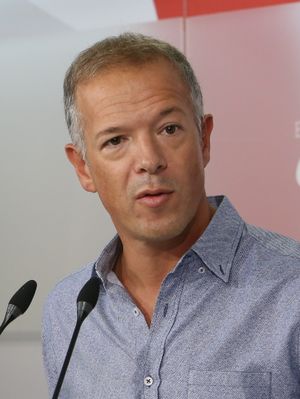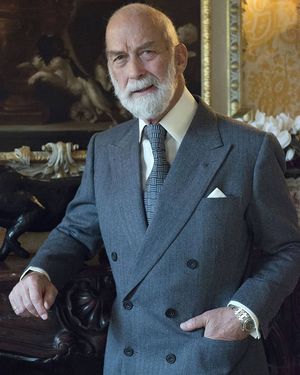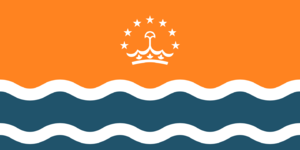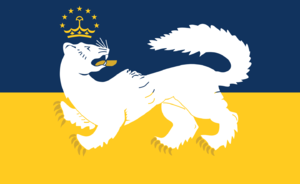More actions
No edit summary |
|||
| Line 29: | Line 29: | ||
|[[Lord Treasurer]] | |[[Lord Treasurer]] | ||
----First Lord of the Treasury | ----First Lord of the Treasury | ||
| | |[[File:Valls.jpg|thumb]] | ||
|Felix Amerigo | |Felix Amerigo | ||
'''The Duke of Valls''' | '''The Duke of Valls''' | ||
| Line 42: | Line 42: | ||
|- | |- | ||
|Lord High Chancellor | |Lord High Chancellor | ||
| | |[[File:Calvo.jpg|thumb]] | ||
|Michel Calvo | |Michel Calvo | ||
'''Earl of Southark''' | '''Earl of Southark''' | ||
| Line 51: | Line 51: | ||
|Lord High Steward | |Lord High Steward | ||
----Second Lord of the Treasury | ----Second Lord of the Treasury | ||
| | |[[File:The Lord Maekar.jpg|thumb]] | ||
|Zacarias Maekar | |Zacarias Maekar | ||
'''Duke of Mountbatten''' | '''Duke of Mountbatten''' | ||
Revision as of 09:33, 12 August 2023
The Balancín Kingdoms, commonly known as Balancía, is a country in the east of the Doggerlands, north of the Fern Plains and surrounding the Newton River. It comprises Rockfield, Newton, Shipley, Southern Bonitana, and the incorporated Guilds of Shore, Obragon, and Asturias. As a Christian monarchy, the Balancín Kingdoms is firmly within the world of Christendom as a majority Pontifical state.
The Balancín Kingdoms was formed by the Royal Charter, signed by King Maximilian the Crusader, when he proclaimed the independence of Rockfield, Newton, and Shipley from the Wiltshire Republic, in August 3023. The Kingdoms claim direct succession from the independent Kingdom of the Rock, which was formed in 2640 when King Philip I declared independence from the Madrilene Empire. The reigning House of the Kingdoms, the House of Murcia, claims direct continuation from the Murcian Kings who established the Kingdom of the Rock back in the 2640s, making the Balancín Kingdoms arguably the oldest state in the Doggerlands.
The Balancín Kingdoms is an executive constitutional monarchy, where the reigning monarch holds significant executive power. There are democratic elements of the government, however, with the lower house of Parliament, the General Courts, being partially elected by the citizenry. However, most of the power of the Kingdoms is held by the nobility. The Balancín Kingdoms maintain a feudal noble structure, with positions of nobility corresponding to ownership and management of land. The Kingdoms are split into 12 duchies, which are then in turn split into dozens of fiefs and fiefdoms, which are held by lesser lords. Each lesser lord is a vassal of their duke, who are in turn vassals to the Crown. This system of vassalage is how the Kingdoms' tax and administration is organized.
Politics and nobility
See main article: Balancín Monarchy, Government of the Balancín Kingdoms, Balancín Parliament
The constitution of the Balancín Kingdoms is centered around the monarchy. The Royal Charter of 3023, which is the primary constitutional text of the Kingdoms, describes the King of the Balancín Kingdoms as "the power of the state", which is "embodied" through him. Through this, then, all executive and governmental power of the Kingdoms is derrived from the King. By the Royal Charter, the King has dispensed many of these powers to the Government of the Balancín Kingdoms and the Parliament of the Balancín Kingdoms. Unlike in the former Wiltshire Republic, where their legislature was sovereign, the power of the Balancín Parliament is granted by the consent of the King.
The government is headed by two key individuals, as outlined by the Royal Charter: the Prime Minister and the Lord Treasurer. Both positions are appointed by the King directly. However, the Royal Charter instructs holders of both offices to "covet" the support of Parliament and to "make endeavours" to gain such support. Despite this, Parliament cannot legally mandate the resignation of the government. Besides the Prime Minister and Lord Treasurer, there are five other Offices of State. The Officers of State, along with the Prime Minister and Lord Treasurer, comprise an informal cabinet which directs the administration of the government.
Offices of State
| Office of State | Officeholder | Took office | Office description | |
|---|---|---|---|---|
| Prime Minister | Vacant |
| ||
| Lord Treasurer
First Lord of the Treasury |
 |
Felix Amerigo
The Duke of Valls |
5 August 3023 |
|
| Lord Keeper of the Privy Seal | Vavant |
| ||
| Lord High Chancellor |  |
Michel Calvo
Earl of Southark |
5 March 3023 |
|
| Lord High Steward
Second Lord of the Treasury |
 |
Zacarias Maekar
Duke of Mountbatten |
21 March 3021 |
|
| Lord High Marshal and Great Constable | Sir Juan Carlos | 5 March 3023 |
| |
| Lord Great Chamberlain | Sir Henry Martel | 5 March 3023 |
| |
Parliament
The Parliament of the Balancín Kingdoms is the legislative branch of the government. It consists of two houses: the General Courts (lower house) and the King's Court (upper house). The King's Court is the house of nobility, with members (Peers) holding noble rank. The nature of this setup means that the King's Court is a body which seldom meets in its entirety. In addition, the clergy is also represented in the King's Court. The King's Court holds equal power to the General Courts but often votes by consensus and acclamation, rather than traditional voting.
The General Courts, in contrast, operate far more like a traditional legislative body. The General Courts is comprised of 24 seats (MPs), each representing a certain element of Balancín society. Half of the seats (12) are directly elected in first-past-the-post district-based elections. The remaining 12 come from certain interest groups and functions of society that operate for "the effective governance of the Kingdoms". The breakdown of seats works as follows:
General Courts seat breakdown
12 seats: democratically elected by the general citizenry
7 seats: selected by the Guilds
3 seats: selected by centers of charity, culture, and learning (e.g., 1 seat for the University of Southern Bonitana)
2 seats: selected by centers of commerce to represent the merchant class (e.g., 1 seat for the Harbour)
The purpose of the non-democratic seats of the General Courts is to give representation to those elements of society that allow it to function more effectively.
Succession
Given the Balancín Kingdoms' status as an executive monarchy, the issue of the succession is one that is pressing to the political state of the nation. Noble titles are created by the King and are all inheritable. The succession typically follows an absolute primogeniture (where titles are inherited by the first born legitimate child, regardless of gender). There is a certain degree of freedom in the succession, with the last will and testament of a holder of noble titles carrying legal weight. However, titles and lands are unable to be divided between siblings. In addition, succession cannot be granted to individuals who are legally barred from inheritance, such as those excommunicated from the Pontifical Church.
The succession of the Crown, however, works differently and is significantly more rigid than the succession of lesser noble titles. The crown may only be inherited by Pontifical, male-only descendants of King Antony Edmund II. The Crown is unique in the Balancín Kingdoms, in that females are unable to inherit. However, the Crown may pass through a female line, provided it is not inherited by a female. This is owing to the Crown's unique position as a Papal Legate of the Pontifical Church.
The succession of the Crown is marked by a series of events. Firstly, upon the death of the Crown, there will be an automatic dissolution of Parliament. The purpose of this is to give Peers and MPs the opportunity to swear allegiance to the new King. The pledging of allegiance and oaths of fealty occur during the Ascension Council, a required event before the recalling of a new Parliament. The Ascension Council formally proclaims the new King, prior to his coronation.
Guilds
The system of Guilds is the Balancín Kingdoms' form of registrating companies and corporations that operate within her, for tax and regulatory purposes. The status of a limited guild (LGs) is given to most corporations. LGs report directly to the central government and so are not subject to the taxing or regulatory operations of the lesser lords. Special rights and privaleges are given to landed guilds, known as patented guilds (PGs), which do not report to the government but report directly to the Crown. PGs often are subject to less tax and regulations than standard LGs.
The highest rank of Guild is the Incorporated Guilds (IGs), or guild stations, which have the most autonomy of any political division of the Balancín Kingdoms. There are currently three IGs: Shore, Obragon, and Asutrias. IGs are subject to the least taxation of any guild and have very few internal regulations with respect to worker rights. Of particular note is that of public holidays, which IGs are not subject to.
Geography
The Balancín Kingdoms is a country of countries, which means that it is comprised of a number of different Kingdoms, principalities, and free cities. The status of Kingdom is a ceremonial one, and typically refers to an historical boundary that is respected within the Kingdoms. The government is unitary and centralised, meaning that authority is central. However, for taxation and regulatory purposes, the Kingdom is divided into 12 administrative zones, known as Duchies, which carry out a number of governmental functions.
Kingdoms
Duchies
| Duchy | Symbol | Ruling Lord | Ruling House |
|---|---|---|---|
| Iberia
The Crownlands |
Maximilian II
King of the Balancín Kingdoms |
House of Murcia | |
| Mountbatten | Zacarias Maekar
Duke of Mountbatten |
House of Maekar | |
| Valls | Felix Amerigo
Duke of Valls |
House of Amerigo | |
| Belemadena | Jamie Calvo
Duke of Belemadena |
House of Calvo | |
| Ander | Jason Ander
Duke of Ander |
House of Ander | |
| Newton | Louis
Prince of the Newton |
House of Murcia | |
| Estaire | Skylar Clay
Duke of Estaire |
House of Clay | |
| Shipley | Sian Grayson-Wark
Duchess of Estaire |
House of Wark | |
| Farleigh | Alec Casterel
Duke of Farleigh |
House Casterel | |
| Albany | Johnathan Montes
Duke of Albany |
House of Montes | |
| Motania | Kamari Ramos
Duke of Motania |
House of Ramos | |
| Carolina | Luca Stamos
Duke of Carolina |
House of Stamos |




